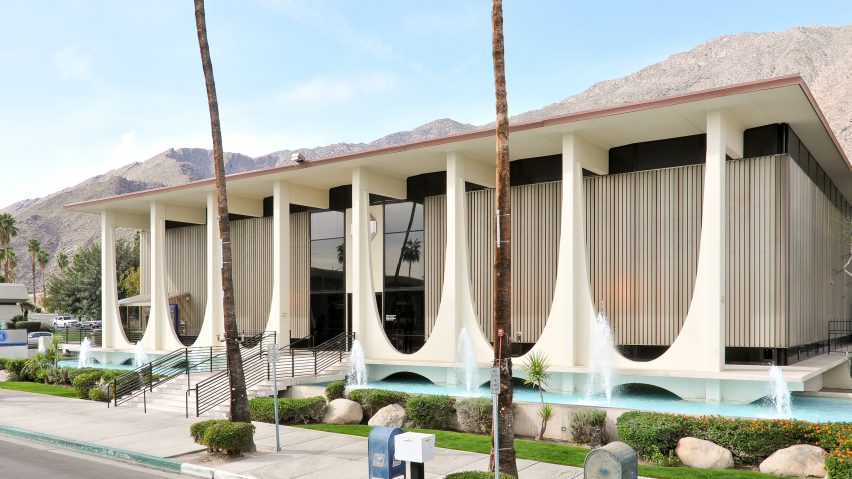To mark this year's Modernism Week in Palm Springs, which starts today, we've rounded up 11 standout buildings located in the Californian desert city often referred to as the mecca of mid-century modernist architecture.
Abernathy House by William F Cody
Sprawled across a plot of land in the middle of Palm Springs, this house by American architect William F Cody is designed for sunny outdoor living, with ample outdoor areas and a lengthy pergola.
Its vast expanses of glass, white exterior and geometric blueprint have drawn comparisons to modernist houses such as Le Corbusier's Villa Savoye and Maison La Roche-Jeanneret.
Find out more about Abernathy House ›
Swiss Miss Houses by Charles DuBois
Charles DuBois, one of modernism's lesser-known architects, is responsible for this collection of low-lying, single-storey residences.
A-frame roofs that stem straight from the ground make the 15 houses stand out drastically from the flat-roofed buildings that cropped up throughout the 20th century in the surrounding neighbourhood.
Find out more about Swiss Miss Houses ›
Tramway Gas Station by Albert Frey and Robson Chambers
Acting as gatekeeper to the modernist mecca that is Palm Springs, Tramway Gas Station is one of the first buildings visible to those travelling south along the road from Los Angeles into the Californian desert city.
The low-lying building is topped by a huge wing-shaped roof that offers shade from the desert sun, a component found in many modernist buildings in the area due to the bright and arid climate.
Find out more about Tramway Gas Station ›
Coachella Valley Savings & Loan bank by E Stewart Williams
Like many other buildings listed here, this bank is topped by a slender overhanging roof, which – along with the panels covering the walls – offers shade from the strong desert sun.
Modernist architect E Steward Williams left openings at the top of the walls to ensure there is plenty of natural light inside.
Find out more about Coachella Valley Savings & Loan bank ›
Hope Residence by John Lautner
Covered by a large domed roof, this concrete residence in Palm Springs' Southridge community has been likened to a mushroom, yet Lautner is said to have modelled the house on a volcano.
Either way, his nods to natural elements, use of curved forms and large expanses of glazing have similarities to buildings by the architect's famous mentor, Frank Lloyd Wright.
Find out more about Hope Residence ›
Twin Palms by E Stewart Williams
Twin Palms was architect E Stewart Williams' first residential project – a house that he designed for music legend Frank Sinatra and his wife.
The 4,500-square-foot (418-square-metre) pad includes a piano-shaped swimming pool, a veranda with square holes and many sliding glass doors that lead outside. The design contributed to William's reputation as one of the Palm Springs "desert modernist" architects.
Find out more about Twin Palms ›
Kaufmann House by Richard Neutra
Built in 1946 by Austrian-American architect Richard Neutra, this boxy two-storey residence has many recognisable elements of modern architecture – a flat roof, pale facade and shaded outdoor spaces.
Its patios are lined with slatted metal fins which provide shade during extreme heatwaves while also offering glimpses of the large boulders, cacti and palms in the sandy gardens.
Find out more about Kaufmann House ›
Bank of America by Rudy Baumfield
Swiss-French architect Le Corbusier's famed Ronchamp chapel, with its bulky overhanging roof and curved lines, was the starting point for this bank designed by Rudy Baumfield.
Constructed in 1959, the bank is covered in vibrant aqua-coloured tiles across its rounded south facade. The structure is much softer in shape than the geometric lines typically associated with modernism but its unusual form and plain decor still fits with the style.
Find out more about Bank of America ›
Another Lautner building, Elrod House is a residence perched on the top of Palm Springs' Araby Cove neighbourhood which featured in the James Bond film Diamonds are Forever.
A dome-shaped roof made up of alternating glass and concrete segments, sliding glass walls across the front of the living area and a large crescent-shaped swimming pool gives the house its modernist edge.
Find out more about Elrod House ›
Palm Springs City Hall by Albert Frey
Palm trees protrude through the open roof of the city's municipal building, Palm Springs City Hall, designed by Albert Frey and built in 1952.
The structure is typical of the modernist style thanks to its low height, flat roof and expansive canopy. Its exterior facade is a light taupe hue to match the desert beyond while the underside is painted in pale turquoise and yellow, matching the sun-drenched city palette.
Find out more about Palm Springs City Hall ›
Steel Development Houses by Donald Wexler
These steel-framed houses by architect Donald Wexler are early experiments in customisable prefab homes, designed to provide a housing model that was low-cost, easily replicable and suited to the desert climate.
Each of the seven houses come with a light gauge metal wall system and one of three steel roof options, including a white "butterfly" roof and a flat roof with overhanging eaves.
Find out more about Steel Development Houses ›
Modernism Week takes place in Palm Springs from 17 to 27 February 2022. See Dezeen Events Guide for an up-to-date list of architecture and design events taking place around the world.

